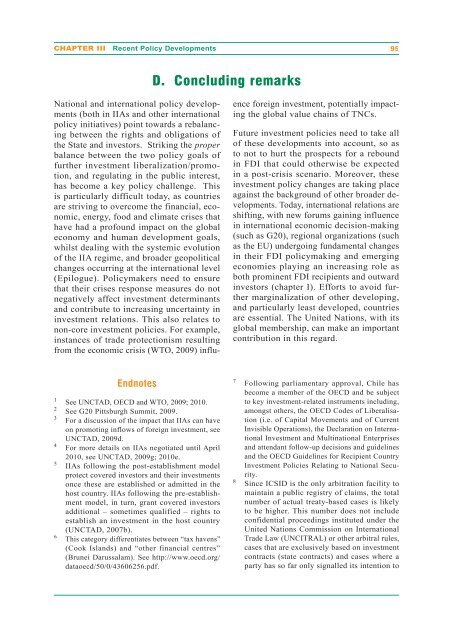UN World Investment Report 2010 - Office of Trade Negotiations
UN World Investment Report 2010 - Office of Trade Negotiations
UN World Investment Report 2010 - Office of Trade Negotiations
You also want an ePaper? Increase the reach of your titles
YUMPU automatically turns print PDFs into web optimized ePapers that Google loves.
CHAPTER III Recent Policy Developments 95<br />
National and international policy developments<br />
(both in IIAs and other international<br />
policy initiatives) point towards a rebalancing<br />
between the rights and obligations <strong>of</strong><br />
the State and investors. Striking the proper<br />
balance between the two policy goals <strong>of</strong><br />
further investment liberalization/promotion,<br />
and regulating in the public interest,<br />
has become a key policy challenge. This<br />
is particularly difficult today, as countries<br />
are striving to overcome the financial, economic,<br />
energy, food and climate crises that<br />
have had a pr<strong>of</strong>ound impact on the global<br />
economy and human development goals,<br />
whilst dealing with the systemic evolution<br />
<strong>of</strong> the IIA regime, and broader geopolitical<br />
changes occurring at the international level<br />
(Epilogue). Policymakers need to ensure<br />
that their crises response measures do not<br />
negatively affect investment determinants<br />
and contribute to increasing uncertainty in<br />
investment relations. This also relates to<br />
non-core investment policies. For example,<br />
instances <strong>of</strong> trade protectionism resulting<br />
from the economic crisis (WTO, 2009) influ-<br />
Endnotes<br />
1 See <strong>UN</strong>CTAD, OECD and WTO, 2009; <strong>2010</strong>.<br />
2 See G20 Pittsburgh Summit, 2009.<br />
3 For a discussion <strong>of</strong> the impact that IIAs can have<br />
on promoting inflows <strong>of</strong> foreign investment, see<br />
<strong>UN</strong>CTAD, 2009d.<br />
4 For more details on IIAs negotiated until April<br />
<strong>2010</strong>, see <strong>UN</strong>CTAD, 2009g; <strong>2010</strong>e.<br />
5 IIAs following the post-establishment model<br />
protect covered investors and their investments<br />
once these are established or admitted in the<br />
host country. IIAs following the pre-establishment<br />
model, in turn, grant covered investors<br />
additional – sometimes qualified – rights to<br />
establish an investment in the host country<br />
(<strong>UN</strong>CTAD, 2007b).<br />
6 This category differentiates between “tax havens”<br />
(Cook Islands) and “other financial centres”<br />
(Brunei Darussalam). See http://www.oecd.org/<br />
dataoecd/50/0/43606256.pdf.<br />
D. Concluding remarks<br />
ence foreign investment, potentially impacting<br />
the global value chains <strong>of</strong> TNCs.<br />
Future investment policies need to take all<br />
<strong>of</strong> these developments into account, so as<br />
to not to hurt the prospects for a rebound<br />
in FDI that could otherwise be expected<br />
in a post-crisis scenario. Moreover, these<br />
investment policy changes are taking place<br />
against the background <strong>of</strong> other broader developments.<br />
Today, international relations are<br />
shifting, with new forums gaining influence<br />
in international economic decision-making<br />
(such as G20), regional organizations (such<br />
as the EU) undergoing fundamental changes<br />
in their FDI policymaking and emerging<br />
economies playing an increasing role as<br />
both prominent FDI recipients and outward<br />
investors (chapter I). Efforts to avoid further<br />
marginalization <strong>of</strong> other developing,<br />
and particularly least developed, countries<br />
are essential. The United Nations, with its<br />
global membership, can make an important<br />
contribution in this regard.<br />
7 Following parliamentary approval, Chile has<br />
become a member <strong>of</strong> the OECD and be subject<br />
to key investment-related instruments including,<br />
amongst others, the OECD Codes <strong>of</strong> Liberalisation<br />
(i.e. <strong>of</strong> Capital Movements and <strong>of</strong> Current<br />
Invisible Operations), the Declaration on International<br />
<strong>Investment</strong> and Multinational Enterprises<br />
and attendant follow-up decisions and guidelines<br />
and the OECD Guidelines for Recipient Country<br />
<strong>Investment</strong> Policies Relating to National Security.<br />
8 Since ICSID is the only arbitration facility to<br />
maintain a public registry <strong>of</strong> claims, the total<br />
number <strong>of</strong> actual treaty-based cases is likely<br />
to be higher. This number does not include<br />
confidential proceedings instituted under the<br />
United Nations Commission on International<br />
<strong>Trade</strong> Law (<strong>UN</strong>CITRAL) or other arbitral rules,<br />
cases that are exclusively based on investment<br />
contracts (state contracts) and cases where a<br />
party has so far only signalled its intention to

















